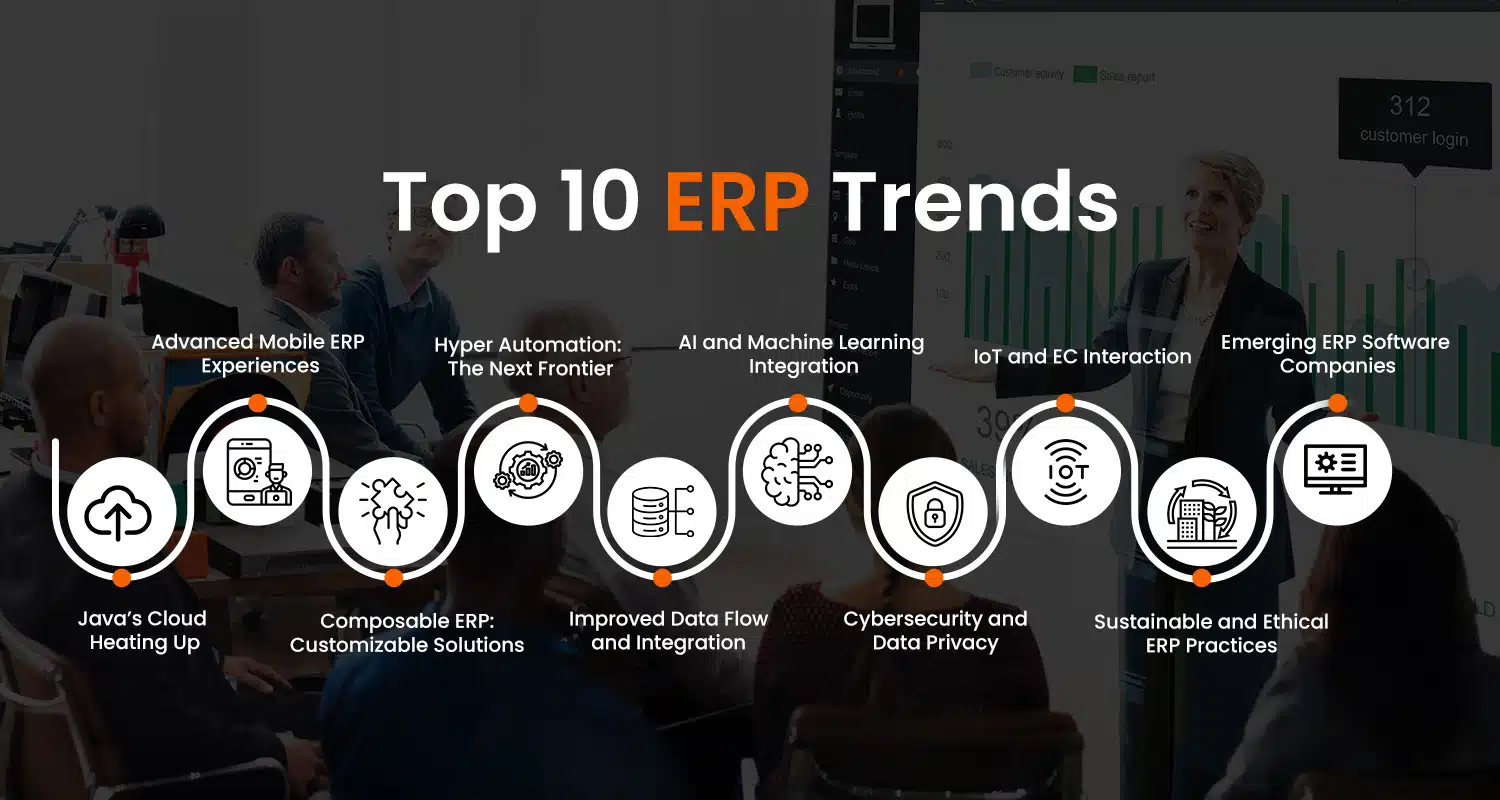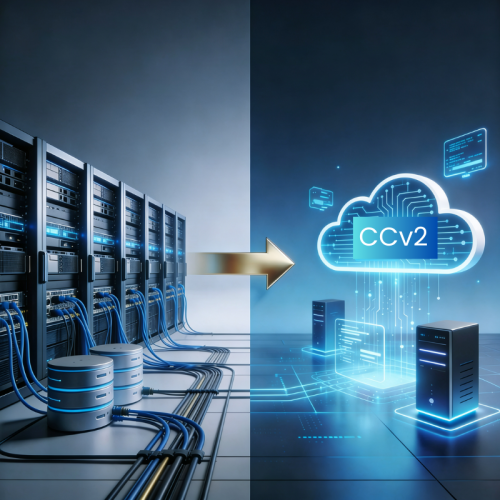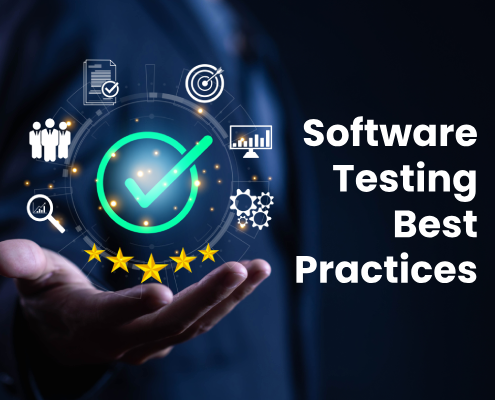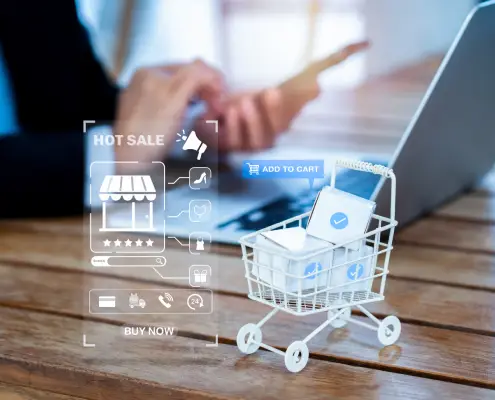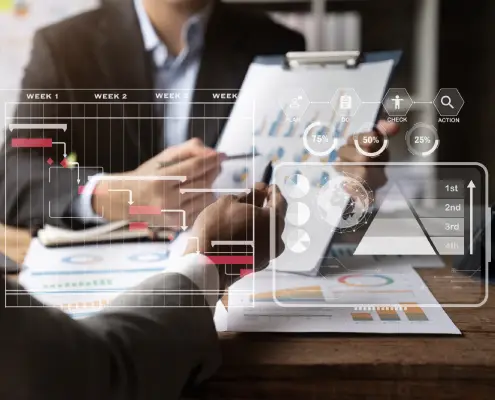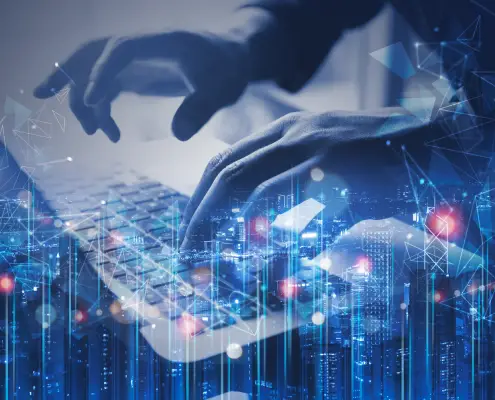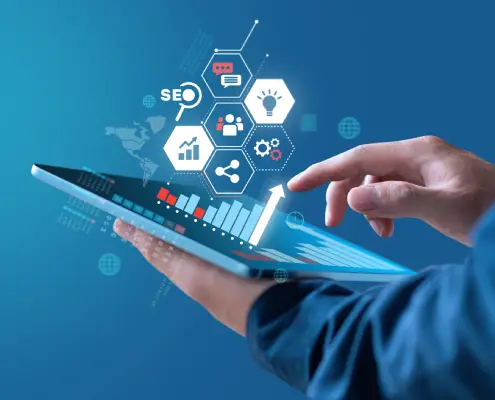ERP systems have evolved as far as they started and continue to advance farther and farther. The advancement into 2024 and beyond reveals some trends that are slowly but surely putting a new face to the ERP application process and environment, making it sleeker, integrated, and user-friendly in every sense of the term. Following are the significant ERP trends shaping 2024 and beyond:
Top 10 ERP Trends
1. Intensified Pressure Prompts Java’s Cloud Heating Up
SaaS is no longer an innovation; it is increasingly becoming a norm in today’s firms and organizations. Many companies are switching to cloud services to achieve great flexibility in use, cost optimization, and ultimate scalability. Cloud adoption for ERP trends has increased due to the increased technological developments in the area and the changes forced by the COVID-19 pandemic such as remote work solutions. It has made it easy for firms to check on the ERP systems from any location, thereby encouraging collaboration and continuation of business in the case of disasters.
Cloud solutions also come with security benefits: many providers are dedicating resources to protect business information given to them through an ERP system. Further regulation and data privacy will impact this area as cloud-based ERP adapts to the specifications, providing businesses with solutions that are trustworthy and adhere to necessary guidelines.
2. Advanced Mobile ERP Experiences
Mobility has gone from simple applications in ERP systems to advanced functioning with support for multiple devices. This synchronisation makes it possible for the user to use a single device like a laptop, desktop computer, mobile phone, smart watch, smart home speaker or smart TV without any incongruity. For example, if a user initiates a task on their work computer, they can then continue at some other time on a smartphone when in traffic, or they may finish it on a home laptop.
This new form of mobility in a SAP ERP system integrates the use of evolving technologies such as Artificial Intelligence and Machine Learning to ‘guess’ client requirements and probable process subsequent actions. It guarantees that users can find the pertinent information and resources they require from any device at their workplace that enhances the productivity in achieving desired outcomes.
3. Hyper automation: The Next Frontier
Hyper automation involves AI, machine learning, and robotic process automation leading to a revolution in ERP systems. While hyper-automation can be best described as simply amplifying what has already been done, it adds an aspect of cognitive processing to ERP systems to make them smart systems that can adjust to new environments on their own. This trend enables organizations to eliminate the need for people to be involved in certain processes by providing the most efficient ways of working.
Hyper-automation can cause supply chain automation wherein depending on daily supply requirements, the inventory levels of the items are adjusted, the time of equipment maintenance, and schedule production plans. At this level of automation, it not only increases efficiency, greatly minimizing the cost of implementation and varying the decision-making abilities.
4. Composable ERP: Allows for Some Degree of Modification
Composable ERP is still a developing concept implemented to provide a dynamic cloud-based ERP where the different responsibilities may be divided up and given to various vendors. The composable ERP systems are therefore not rigid in their approach; they enable companies to choose which of the individual components they want to introduce or apply in their organizations. Unlike in the conventional ERP where the companies must work under the system package, this allows them to work under their desired package.
One of the key benefits that organizations can enjoy when using composable ERP systems is the ability to efficiently address dynamic conditions that may exist in the market as well as the ability to address changes that may exist in the internal processes of an organization. For example, a company to which these modules may be implemented may have basic packages such as the basic financial and material management and may expand to additional applications such as CRM, human resource, or supply chain management applications. It also helps to ensure that companies implement and adapt ERP systems in monthly increments that do not disrupt business operations.
5. Artificial Intelligence and Machine Learning
AI and machine learning are some of the most crucially witnessed ERP trends. They have found their way into many enterprise systems and are now part of ERP systems as well. These technologies allow the ERP systems to process massive amounts of data, understand the pattern of data and give out the result for action. For instance, through AI-based analytics, there are estimates of future demand, other factors such as the profitability of certain prices for certain goods or services, and customer satisfaction.
There are also various other areas of application of machine learning algorithms, which include enhancing the reliability of the financial reports and records, identification of configurations and trends of transactions that are suspicious, and prediction of failure of types of equipment before they fail. AI and machine learning will prove instrumental in influencing ERP systems and making more informed decisions based on data acquired in them.
6. Improving the Flow-Through and Integration of Information and User Interfaces
Users are integral to any system, and this is especially the case for ERP systems where user experience (UX) issues contribute to the success or failure rate of the systems. As we have seen there is a significant trend in the current SAP ERP system aimed at providing a smooth and more operational interface to support usability in various working environments. In the future SAP ERP systems are likely to be presented as easy to learn, with a device and presentation-friendly UI.
Other features like voice control, directives prompted by chat, recording commands, and natural language interfaces will be instrumental in enriching the user experience. These features will make it easier for employees to interact with ERP systems, reducing training time and improving overall efficiency.
7. Interaction with IoT and EC
Currently, IoT and Edge Computing remain essential as the ERP trends in the operation of ERP systems. With the implementation of IoT devices across industries, a massive volume of data can be gathered and fed into ERP systems in real time to track multiple processes. For instance, it is possible to use IoT sensors that can follow equipment functionality in production facilities and make maintenance requests when existing abnormalities are noted.
Edge computing is a technology that works in conjunction with IoT to process information across network nodes, closer to the origin of data, which enhances reaction time. The synergy of these systems enables businesses to use real-time data to manage operations effectively, to increase the transparency and effectiveness of the supply chain, and to serve the consumer better.
8. Cybersecurity and Data Privacy
Cybersecurity and data privacy remain two critical areas of concern for individuals and organisations across the globe. As the systems transform and become integrated with other processes, there are increased vulnerabilities coupled with the disclosure of more information. Due to the recent developments in cyber threats, companies must recognise the importance of securing their ERP platforms and making sure that they meet the modern standards of data protection. Several more developments can be seen in the future of cloud based ERP, such as superior security features like encryption, multi-factor authentication and threat detection systems being invested by companies.
The automotive ERP systems providers also emphasise meeting the regulatory requirements, including GDPR, CCPA, and other data privacy laws. This focus on security and privacy will go a long way in ensuring that businesses secure their data and keep the confidence of their consumers.
9. More ERP software companies emerging world widely
Now the global market is fast-growing and adapting for ERP software products. This list includes prominent firms based on SAP ERP systems that are participating in the development of global world-class ERP solutions and services provided to businesses. However, its goals are achievable through its strong expertise in software development, competent solutions and relatively low costs that allow it to compete with giants from around the world.
This has led to the growth of the SAP ERP system providers mainly because of a pool of talents, offering reasonable prices for the software they develop, and focusing heavily on innovations. Thus, ERP software companies are ready to continue their development and to meet a constantly growing number of requests from global businesses, which are beginning to appreciate the virtues of ERP systems.
10. Sustainable and Ethical ERP practices
Nowadays, stakeholders and customers demand to know that the products they are buying or the services they are consuming are sustainable and have been produced following ethical business standards. To underpin such initiatives, there is a growing globalization of tools within ERP systems to incorporate sustainability metrics. For instance, ERP applications can track energy usage, waste and carbon traceability in large organizations so that conservation is enhanced.
Also, ERP systems can make it ethical to source products and supply retail chains since it is possible to check if suppliers follow ethical norms. As society becomes more concerned about sustainability and ethics, the ERP system will play an important role in satisfying business goals.
Conclusion
ERP system remains an open and exciting field that shows great promise in the future. BEC/ECC, cloud, mobile-first, hyper-automation, and composable ERP are emerging and evolving trends that are creating impressive performance gains and a superior user experience in 2024 and beyond. With time, due to advancements in technologies such as AI, IoT and edge computing, ERP systems would become smarter and data-driven thus helping the firm enhance its decision-making processes for competitiveness.
The emergence of new ERP software companies globally and the current trends concerning cybersecurity, data protection, and environmentally sustainable practices highlight the opportunities that are now available in today’s modern ERP systems. Thus, by adopting such trends, organizations can optimize the full potential of ERPs that foster innovation, solve operational issues, and bring overall success over the long run.

